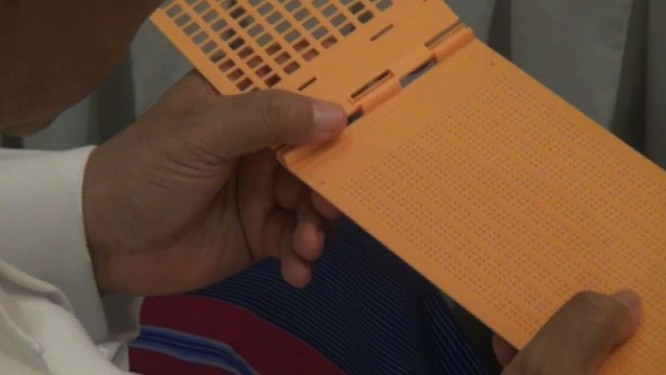The Union Election Commission (UEC) has pledged to assist people with disabilities so they may conveniently vote in the upcoming general election.
Tin Aye, chairman of the UEC, said the commission was working on making polling procedures more convenient for citizens who have disabilities, primarily focussing on blind and deaf voters.
The chairman said, “According to our discussion, voting [for the blind] can be made a lot more convenient by sticking up templates, including the names of candidates, political parties and logos on the ballots.”

Speaking at a workshop in Naypyidaw designed to promote participation of voters with disabilities on Wednesday, he also said instructions on voting procedures with Braille and sign language will be made available at poll stations to facilitate people who may be blind or deaf.
“We compiled a list of voters with disabilities across the country when we prepared the voter lists and facilitated procedures for them at local polling stations,” Tin Aye said.
“Constituencies with a heavy population of people with disabilities will get model polling stations which we are looking to set up in Kyimyindaing, Pyin Oo Lwin and Sagaing. Those with a sizable population of people with disabilities will get separate polling booths, but disabled people who live in constituencies with a small population may have to share booths with regular voters,” he said.
Aung Ko Myint, chairperson of the Myanmar National Association of the Blind, said that in the past, sight-impaired voters have been allowed to bring an assistant into the polling booth to help with their vote. However, trusting the assistant to vote properly according to the blind voters’ wishes can be a tricky matter.
“For example, if I bring my father or mother into the poll booth as an assistant, there is no way for me to know if he or she voted for a different party. It would be the better if we could vote for ourselves, with our own hands, minds and hearts.”
[related]
ACE Electoral Knowledge Network, an independent international think tank, said that special measures must be implemented to allow sight-impaired voters to cast their vote in secret.
“The practice of elections in nearly every nation results in the blind citizen being dependent on another to cast his or her ballot. And logic tells us that a secret between two people is no secret,” ACE says on its website.
“In nations which use a paper ballot for voting, numerous jurisdictions have developed a ballot guide to help a blind voter independently mark the ballot [paper]. In most instances, this guide is a folder in which the regular ballot is inserted. The folder contains holes which correspond to the boxes on the ballot paper. On the folder are markers – sometimes Braille, sometimes raised bumps or lines – that help the voter navigate up and down the folder. Some election management bodies use a cassette tape as supplementary guide to the folder.”
According to the recently released results of the 2014 census, Burma has an extremely high percentage of blind and sight-affected persons.
Of a population of just over 51 million, more than 2.3 million list themselves as ‘disabled’, with around half – one a quarter million people – claiming to have impaired eyesight.



